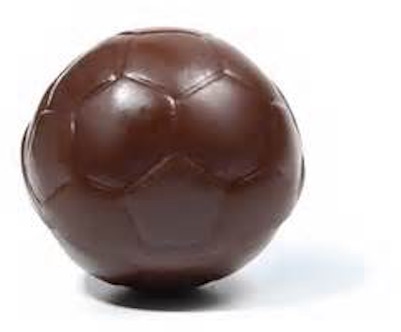Chocolate and Soccer Players: Yes – IT IS OK TO LOVE CHOCOLATE
Youth Soccer News: The latest Sports Nutrition News from Nancy Clark
 Chocolate – is chocolate merely a gift from the gods or curse for soccer players who try to care about nutrition and stay away from sugar highs? From Godiva to M&Ms and Kit Kat, Cadbury, Toblerone, Ghirardelli, Lindt and America’s top selling Hershey – the perfect Chocolate is a delicious blend of cream, milk and cocoa, and actually has nutritional valuable! The Aztecs believed chocolate was from the God of wisdom – this dark substance has been a favorite of children and adults since it first appeared in Spain in the sixteenth century – but what we care about is it bad for soccer players? Most soccer moms would never let their elite youth soccer players eat chocolate on the soccer field. The real question is why?
Chocolate – is chocolate merely a gift from the gods or curse for soccer players who try to care about nutrition and stay away from sugar highs? From Godiva to M&Ms and Kit Kat, Cadbury, Toblerone, Ghirardelli, Lindt and America’s top selling Hershey – the perfect Chocolate is a delicious blend of cream, milk and cocoa, and actually has nutritional valuable! The Aztecs believed chocolate was from the God of wisdom – this dark substance has been a favorite of children and adults since it first appeared in Spain in the sixteenth century – but what we care about is it bad for soccer players? Most soccer moms would never let their elite youth soccer players eat chocolate on the soccer field. The real question is why?
Chocolate—Is it a bad food for soccer players? Is it an addictive drug? Is chocolate the instigator of dietary disasters? Or is it a health food, dieter’s weight loss aid, and effective recovery food for tired, hungry athletes? Nancy Clark votes for the later! “Personally and professionally, I like to think of chocolate (in moderation, of course) as one of life’s pleasures,” says nutrition expert Clark.
Here is research that might be of interest to soccer players who love chocolate. Let’s start with the extreme ….
Chocolate Cake—For Breakfast?
Chocolate cake for breakfast enhances weight loss.
Really? While this may seem unbelievable the answer is YES — according to researcher Prof. Daniela Jacubowicz (1).
The subjects were 193 obese, non-diabetic adults who ate either a 300-calorie low carbohydrate breakfast or a 600-calorie breakfast that included protein plus chocolate cake (or another sweet dessert). Both groups were instructed to eat the same amount of total calories: 1,400 for the women and 1,600 for the men. In the first 16 weeks, both groups lost an average of 33 pounds per person. But in the second half of the study, the no-cake group had poor compliance and regained an average of 22 pounds per person while the cake-eaters continued to lose another 15 pounds each. By 32-weeks, the cake eaters had lost about 40 pounds more than their peers.
Chocolate – eating chocolate cake made dieting easier? Well, perhaps the trick was eating the cake first thing in the morning!
Prof. Jacubowicz noticed that those who had cake for breakfast had fewer cravings for carbohydrates and sweets later in the day. By frontloading their calories, they were less hungry and less likely to stray from their food plans. They had curbed their cravings for sweets and treats, in comparison to the group that ate the smaller breakfast.
So what does this research mean for you, a hungry soccer player?
1) Eat a satisfying breakfast that leaves you content. Do not stop eating breakfast just because you think you should.
2) If you want a treat, such as chocolate cake, enjoy it earlier in the day, as opposed to indulging at 9:00 p.m. when you are tired, too hungry, and lack the mental energy needed to stop yourself from overeating.
Think of it as having dessert after breakfast instead of after dinner.
3) Even on a weight reduction diet, you should eat what you truly want to eat, without deprivation of your favorite foods. Otherwise, you’ll end up doing “last chance” eating.
Don’t fall victim to slipping once. You know, “I just blew my diet by eating cake, so I might as well keep eating it because this is my last chance before my diet starts again…”
Dark Chocolate—A “Health Food”?
 It’s not a secret: a candy bar contains primarily nutrient-poor calories from sugar and fat. For example, a Hershey’s Milk Chocolate Bar (43 g) contains 220 calories—of which 110 calories are from Fat – 46% are from sugar, 55% from fat. This Hershey’s bar has no Vitamin A or C and only 8% calcium and 8% iron. Hence, you want to enjoy milk chocolate in moderation, not in binges…. More Nutrition Information
It’s not a secret: a candy bar contains primarily nutrient-poor calories from sugar and fat. For example, a Hershey’s Milk Chocolate Bar (43 g) contains 220 calories—of which 110 calories are from Fat – 46% are from sugar, 55% from fat. This Hershey’s bar has no Vitamin A or C and only 8% calcium and 8% iron. Hence, you want to enjoy milk chocolate in moderation, not in binges…. More Nutrition Information
Dark chocolate also contains flavonoids, health-protective compounds found in many plant foods including tea, apples, and onions. Epidemiological surveys of large groups of people indicate those who regularly enjoy chocolate consume more of these health-protective flavonoids than non-chocolate eaters. This reduces their risk of heart disease.
Did you know that in the Netherlands, elderly men who routinely ate chocolate-containing products reduced their risk of heart disease by 50% and their risk of dying from other causes by 47% (3). Maybe a daily (preferably dark) chocolate fix can be a good idea?
Chocolate Milk for Recovery?
If you’ve just had a killer workout and want to rapidly refuel and repair your muscles, boost your blood sugar, and replace sweat losses—as well as reward yourself with a tasty treat—reach for some low fat chocolate milk! Research indicates refueling with chocolate (or any flavored) milk enhances recovery of both fluids and muscles better than the standard carb-only, sugar-based sports drink.
It is simple – drinking chocolate milk after a tough soccer practice can help replenish exhausted muscles and aid in a player’s recovery. The International Journal of Sport Nutrition and Exercise Metabolism has named chocolate milk as an optimal post-exercise recovery aid.
Eveyone knows that there has been growing interest in the potential use of milk as an exercise beverage, especially during recovery from resistance training and endurance sports. Based on the research, milk appears to be an effective post-resistance exercise beverage that results in favourable acute alterations in protein metabolism. Milk consumption acutely increases muscle protein synthesis, leading to an improved net muscle protein balance.
Furthermore, when post-exercise milk consumption is combined with resistance training (12 weeks minimum), greater increases in muscle hypertrophy and lean mass have been observed. Although research with milk is limited, there is some evidence to suggest that milk may be an effective post-exercise beverage for endurance activities. Low-fat milk has been shown to be as effective, if not more effective, than commercially available sports drinks as a rehydration beverage. Milk represents a more nutrient dense beverage choice for individuals who partake in strength and endurance activities, compared to traditional sports drinks. Bovine low-fat fluid milk is a safe and effective post exercise beverage for most individuals, except for those who are lactose intolerant.
Anyone responsible for stocking the recovery food table for tired, thirsty soccer players who want to rapidly refuel after a hard workout will tell you chocolate milk is an all-time favorite. Weight-conscious female athletes, in particular, let themselves enjoy this treat “guilt-free” and meanwhile boost their intake of nutrient commonly missing in their diet, such as high quality protein, riboflavin, calcium, and vitamin D. What a positive change from their embattled relationship with chocolate! This is good.
But shouldn’t we be staying away from sugary foods? The World Health Organization recommends a limit of 10% of calories from refined sugar per day; that’s about 200 to 300 sugar-calories for most athletes. Getting sugar from chocolate milk is nutritionally preferable than from sports drinks. Milk’s high quality protein, calcium, vitamin D, riboflavin and a host of other important nutrients is far better than sugar water with a dash of salt!
The bottom line
By no means is chocolate the key to a healthy sports diet, nor is eating lots of dark chocolate preferable to snacking on apples and bananas. We all need to eat chocolate in moderation so it does not crowd-out other nutrient dense foods. But chocolate can be balanced into an overall wholesome sports diet and add pleasure to the day—even if you are dieting to lose weight. For chocolate lovers, deprivation of chocolate may create more problems than it solves.
The Bottom Line
Performance starts with good nutrition. If you make the effort to eat properly, saying yes to occasionally eating chocolate can be simple and smart.

References
- Jakubowicz D, O Froy, J Wainstein, M Boaz. Meal timing and composition influence ghrelin levels, appetite scores and weight loss maintenance in overweight and obese adults. Steroids 77(4): 323-331, 2012.
- Peters, AL, MB Davidson, K Eisneberg. Effect of isocaloric substitution of chocolate cake for potato in type I diabetic patients. Diabetes Care 13(8):888-92, 1990.
- Buijsse B, Feskens EJ, Kok FJ, Kromhout D. Cocoa intake, blood pressure, and cardiovascular mortality: the Zutphen Elderly Study. Arch Intern Med. 27;166(4):411-7, 2006.
- Lunn WR, Pasiakos SM, Colletto MR, Karfonta KE, Carbone JW, Anderson JM, Rodriguez NR. Chocolate milk & endurance exercise recovery: protein balance, glycogen and performance. Med Sci Sports Exerc. 44(4):682-91,2012.
SIDEBAR: Nutritional and medical advice changes with new discoveries and interpretations. Always check with your medical provider and/or nutritionalist for what is best for you and your family. And research and read information on nutrition!
Boston-area sports nutritionist Nancy Clark MS RD counsels both casual exercisers and competitive athletes in her private practice in Newton MA (617-795-1875).
She is author of the best-selling Nancy Clark’s Sports Nutirtion Guidebook and co-author with Gloria Averbuch of Food Guide for Soccer: Tips and Recipes from the Pros.






